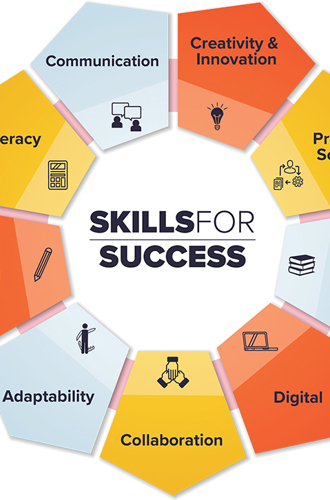Change at work and in life is normal. But new technologies, globalization, and automation mean changes are happening faster than ever. Employees need the right skills—the Skills for Success—to adapt to dynamic work environments, new technologies, and changing workplace demands.
Researchers have identified 9 core skills workers need in almost every job, whether it’s an entry level position or complex professional work. Strong skill levels:
- Offer benefits at all stages of work life, including easier entry or re-entry into the workforce, improved job performance, and better career advancement.
- Make learning new skills and tasks easier.
- Help people transfer what they know from one context to another.
By focusing on these skills with your clients, you can help them succeed in increasingly complex workplaces.
The 9 skills
The Government of Canada, together with the provinces and several national and international organizations, have identified 9 skills for success that are building blocks for life-long learning.
These 9 skills include so-called soft skills like collaboration and communication, as well as more traditional skills like reading, writing, and numeracy. These skills often intersect in the workplace. Workers often need basic reading and writing skills to use digital technologies, for example, or collaboration and communication as a means of problem solving.
The 9 core skills for success are:
- Adaptability—being able to learn new skills, deal with change, and not give up.
- Collaboration—working with people from diverse backgrounds and cultures, and dealing with co-workers and others in difficult situations.
- Communication—understanding, listening to, and sharing information with others.
- Creativity and innovation—coming up with new and different ways to do things.
- Digital—using digital technologies to solve problems and to find and share information.
- Numeracy—using math information in different formats (numbers, words, symbols).
- Problem solving—knowing how to find the right information, find new solutions, and make decisions.
- Reading—finding and using information written in words, symbols, or images.
- Writing—sharing ideas and information by using words, symbols, or images.
The Government of Canada identifies the components and proficiency levels of each skill.
Why these skills matter
“Skills for success are essential for people who want to enhance their employability, productivity, and success in the workplace. Helping someone to understand the skill areas they’ve mastered, and the areas where they need to improve, makes them better equipped to find, keep, and do well at their job.”
Today’s workers must continue learning throughout their career to keep up with workplace changes. Increasing automation and new technologies are replacing jobs, making it more challenging for people with lower skill levels to find work. Those who aren’t strong in the 9 core skill areas will find it more difficult to keep up at work and move up in their career.
Did you know?
- Almost half of Canadian adults have skill levels below what’s needed in our knowledge-based society for safe and productive work.
- In Alberta, 1 in 5 adults lives with literacy and numeracy challenges.
- Higher education levels don’t necessarily mean people have higher skill levels.
As your clients master the 9 skills for success, they’ll have more opportunities for employment, learning, and higher incomes. They’ll become part of a more highly skilled workforce, leading to greater productivity, profitability, and growth for Alberta’s economy.
Using the Skills for Success model
What’s new
The Skills for Success model replaces the former Essential Skills framework. It includes several changes, such as:
- 2 new skills – adaptability as well as creativity and innovation.
- The integration of broader document use into reading, writing, and numeracy.
- Title changes for some skills to broaden the meaning. Oral communication, for instance, is now just communication, which better includes tasks like listening and interacting with people.
Skills training tools
Online learning courses
Improve your core skills at home by taking online courses. Online learning offers courses covering a wide range of topics, and some platforms offer free courses or free trials. Find out what your options are by searching these online learning sites for the skills you want to build:
You can use many different tools as you guide your clients through the 9 skills for success. Note that some of these tools may still be using the previous Essential Skills framework:
- Guided Pathways is a Government of Canada online training project for career development practitioners. It gives you tools to assess people’s needs and guide them to develop the skills for success.
- Alberta Workforce Essential Skills (AWES) offers employers skills training tailored to the needs of their workforce. AWES also has a range of skills-related resources you can use when working with a client or business.
- Alberta Supports provides information and referrals for training and education.
- The essential skills profiles of the Government of Canada’s Job Bank describe the 9 essential skills needed for a wide range of different careers.
- The Government of Canada’s Skills and Competencies Taxonomy streamlines workplace terms so people across the country use common language to describe different skills.
Assessment tools
As a career advisor, one of your jobs is to help people understand how to assess their skills. This lets them know the skills they do well and those they should improve.
A full range of assessments for the new Skills for Success model is still under development. In the meantime, career advisors are encouraged to use the former Essential Skills framework assessment tools. These are available from several sources. Some are free; others charge a fee.
- The Core Skills Exercise here on alis is a self-assessment tool that scores a person on each of the 9 Skills for Success. It's provided alongside other career planning self-assessment tools within the Know Yourself section of CAREERinsite.
- The Skills for Success site lists several assessment tools, including the self-assessment for trades and the First Nations, Inuit and Métis Essential Skills Inventory Project.
- The Essential Skills Mobile App lets your clients test their level in the essential skills. It also recommends appropriate career options.
- Alberta Workforce Essential Skills provides an online assessment tool that measures document use, reading, and numeracy skills. It can be used to assess skills, create specific training for what’s needed, and measure progress.
- Educators, employees, students, and employers can use the Test of Workplace Essential Skills (TOWES) to measure and build reading, document use, and numeracy skills.
- The Employability Skills Assessment Tool (ESAT) helps educators and career advisors assess and develop people’s social and emotional skills.
- The Government of Canada’s essential skills indicator has short quizzes to help people recognize their skill levels for numeracy, document use, and reading. It can also measure how much a person has improved after taking skills training.
Meeting the needs of newcomers
Newcomers to Canada are more likely to have gaps in their skills. In many cases, these skill gaps aren’t apparent because they’re masked by language barriers. When you work with newcomers, it’s important to understand the relationship between skill levels and Canadian Language Benchmarks (CLB). NorQuest College has developed 2 frameworks to use with people at different CLB levels.
Funding for skills training
Funding is available both for businesses to start training programs for employees and for people who want to work on their own to develop or improve their skills.
The Government of Alberta offers several options:
- The Workplace Essential Skills Training Program helps employers who don’t have the resources to deal with essential skills issues. Employers must partner with one training provider and the Alberta government to be eligible.
- The Canada-Alberta Job grant offers employers up to $10,000 per employee every year to supplement training costs.
- Training for Work programs include training support for skilled immigrants and people who are unemployed or marginally employed.
- Settlement, integration, and language project grants are offered to businesses, not-for-profits, post-secondary institutions, and community organizations. The second stream, which strengthens labour market integration, funds skill development projects with a language component for underemployed or unemployed newcomers.
The federal government funds different types of training at different times, so keep up to date on the current list.
The Canada Training Benefit helps people pay for training. It also provides income support and job protection while they’re learning.


